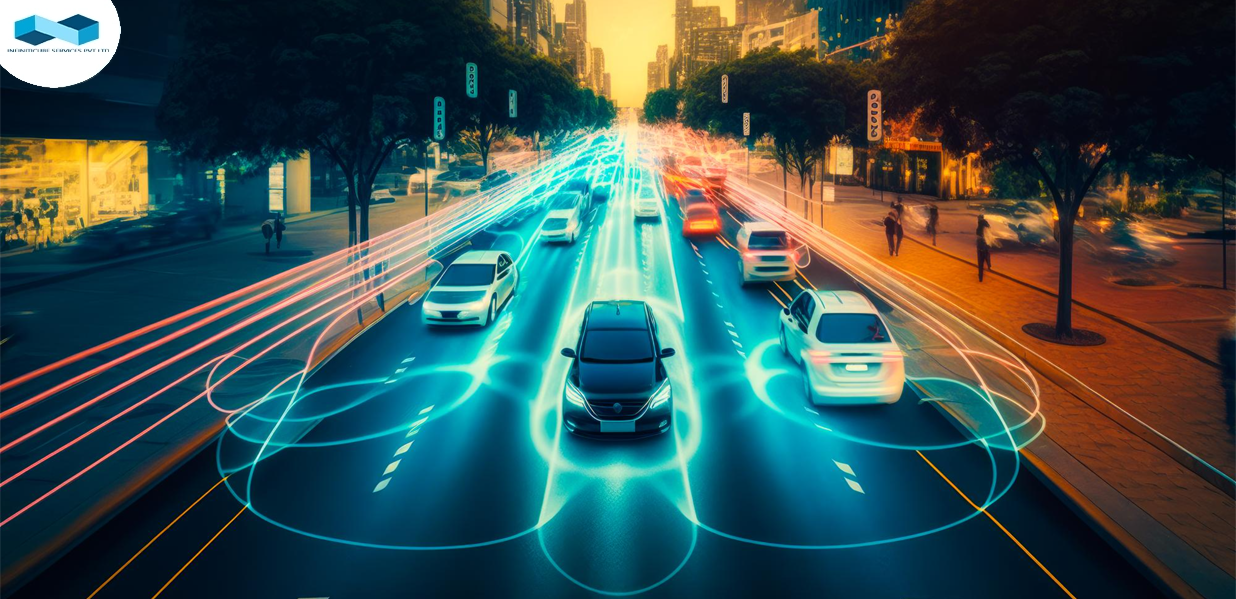How Smart Sensors Are Driving Smart Cities Towards Growth
Smart cities are the future of urban living that will improve the quality of life for residents. It enhances sustainability and streamlines city management. These cities use digital technology, particularly the Internet of Things (IoT), to optimize everything from traffic and waste management to energy usage and public safety. The goal is to create more responsive, efficient, and supportive urban environments where people can thrive amidst growing populations and the challenges of urbanization.
These devices collect data from their environment, including anything from traffic patterns and air quality to structural integrity and noise levels. What makes these sensors "smart" is not just their ability to collect data, but also to analyze and communicate this data in real-time. This capability allows city officials and planners to make informed decisions quickly, addressing issues as they arise and planning for the future more effectively.
In this blog, we are going to discuss how with integration of smart sensors in smart cities have headed them towards tremendous growth.
Also Read: How Smart Sensors Driving Industry 4.0 Towards Growth
Understanding Smart Sensors
Smart sensors are a step above their traditional counterparts. While a conventional sensor merely detects changes in its environment—like a thermometer measuring temperature—a smart sensor takes this a step further by analyzing, processing, and sending the data it collects. This means smart sensors can make sense of what they're detecting and communicate this information to other devices or systems. It's like comparing a simple light switch to a smart thermostat that learns your schedule and adjusts your home's temperature automatically.
The Technology Behind Smart Sensors
The real magic of smart sensors lies in the technology that powers them:
- IoT Connectivity: IoT, or the Internet of Things, is a network of interconnected devices. Smart sensors use IoT connectivity to communicate with the internet, allowing them to send data to and receive commands from other devices or systems anywhere in the world.
- Data Analytics: Smart sensors collect massive amounts of data. Data analytics is the process of examining this data to find patterns, trends, and insights. This can help cities predict traffic congestion, detect potential environmental hazards, and much more.
- AI Integration: Artificial Intelligence (AI) enables smart sensors to not just collect data but to learn from it. Over time, AI can help sensors become more accurate and efficient, predicting potential issues before they happen and automatically adjusting to changing conditions.
The Role of Smart Sensors in Smart Cities
Smart sensors are like the city's senses, allowing it to see, hear, and feel the environment and the activities within it. These advanced devices collect data from their surroundings, which is then used to improve the lives of the residents by making the city more efficient, safe, and clean.
Examples of Smart Sensor Applications
Traffic Management
Smart sensors play a crucial role in managing urban traffic. Sensors on roads and at intersections collect data on vehicle counts, speeds, and congestion levels. This information is used to optimize traffic signals in real-time, reducing wait times and improving the flow of traffic. Smart parking sensors can guide drivers to available parking spots, reducing the time spent circling the block.
Waste Management
In the realm of waste management, smart sensors attached to garbage bins can notify city services when bins are full and ready for collection. This ensures that waste is collected more efficiently, with routes optimized to save time and fuel, keeping the city cleaner and reducing the carbon footprint.
Environmental Monitoring
Smart sensors continuously monitor air and water quality, providing data that can alert authorities to pollution outbreaks or other environmental hazards. This enables swift action to mitigate risks and protect public health and the environment.
Public Safety
For public safety, smart sensors can detect unusual sounds, like gunshots, and immediately alert law enforcement, speeding up response times. In case of a fire, sensors can pinpoint the location and help in quick evacuation and response, potentially saving lives.
Ways Smart Sensors Driving Smart Cities Towards Growth
Smart cities sound like something out of a science fiction novel, right? Well, they're more real than you might think, and smart sensors are a big reason why. These tiny technological marvels are helping cities become more efficient, safer, and downright smarter. Let's dive into how they're making that happen.
Making Sense of Smart Sensors
Just as our senses collect information for our brain to process, smart sensors gather data for the city to analyze and act upon. These aren't your average sensors; they're equipped with the ability to not only collect data but also to analyze it and make decisions. From monitoring air quality to keeping an eye on traffic flow, they're the unsung heroes of the smart city revolution.
Traffic: No More Gridlock
Ever been stuck in traffic and wished for a magic wand to make it all go away? Smart sensors might just be that wand. By monitoring roads and traffic patterns, these sensors can adjust traffic lights in real-time to reduce congestion.
Energy: Saving Power, Saving the Planet
Smart cities aren't just about convenience; they're also about being green. Smart sensors in streetlights can adjust the brightness based on the time of night and whether anyone is around. This not only saves energy but also cuts down on light pollution, making the night sky clearer for everyone.
Safety: A Helping Hand in Emergencies
In emergencies, every second counts. Smart sensors can detect things like smoke or unusually high levels of certain chemicals in the air, instantly alerting emergency services. This rapid response can save lives and prevent disasters from escalating.
Environment: Keeping the Air Clean
If you've ever worried about air pollution, smart sensors are on the case. They monitor air quality across the city, identifying pollution hotspots. This data can help cities take action to reduce pollution, making the air cleaner for everyone.
Public Services: Trash Talk
Even garbage collection gets smarter with sensors. Waste bins equipped with smart sensors can alert collection services when they're full, optimizing routes and making the process more efficient. This means fewer overflowing bins and cleaner streets.
Challenges and Solutions: Smart Sensors in Smart Cities
Here, we explore the main challenges associated with deploying smart sensors in cities and the solutions that can guide us toward overcoming them.
Technical Challenges
Sensor Deployment
Deploying sensors across an urban landscape is no small feat. It requires careful planning to ensure coverage and functionality, considering urban density, infrastructure age, and environmental factors. The challenge is to install these devices in a way that they seamlessly integrate into the city's fabric without disrupting daily life or the aesthetics of the environment.
- Solution: A strategic approach to sensor deployment involves leveraging existing infrastructure, such as streetlights and public buildings, as hosts for these smart devices. Additionally, involving community input can lead to innovative placement strategies that respect the urban aesthetic and functionality.
Data Security and Privacy Concerns
As sensors collect vast amounts of data, securing this information against unauthorized access is paramount. Furthermore, protecting citizens' privacy – ensuring that the data collected does not infringe on individual rights – is a significant concern.
- Solution: Implementing robust encryption methods and secure data protocols can safeguard data from cyber threats. Privacy concerns can be addressed by anonymizing data and ensuring transparency about data collection practices and usage. Regular security audits and adherence to international data protection standards can further reinforce trust and security.
Financial Challenges
Funding Models
Financing smart city projects, including sensor deployment, is a substantial hurdle. The initial investment for smart sensor technology and infrastructure can be significant, and not all municipalities have the resources to fund these projects outright.
- Solution: Innovative funding models, such as public-private partnerships (PPPs), can provide the necessary capital for smart city initiatives. These partnerships allow cities to leverage private sector investments, while companies benefit from new business opportunities and the chance to shape the smart cities market. Grants and subsidies from government agencies can also support these ventures.
Public-Private Partnerships
While PPPs offer a viable solution for funding smart city projects, they come with their own set of challenges, including aligning the goals of public and private entities, ensuring equitable risk distribution, and maintaining transparency and accountability.
- Solution: Clear contractual agreements, robust governance structures, and open communication channels are crucial for the success of PPPs. Establishing mutual objectives and shared benefits from the outset can align interests and foster collaboration between the public and private sectors.
Conclusion
Smart sensors are key to turning cities into smart cities by collecting essential data, such as air quality and traffic, allowing for better city management and quality of life improvements. They are crucial for real-time insights and sustainable urban development. The advancement of smart cities requires the cooperation of urban planners, technologists, policymakers, and citizens, emphasizing the need to invest in and integrate smart sensor technology.
Future smart cities will focus on sustainability, efficiency, and innovation, with technology advancements making sensors smaller, more energy-efficient, and AI-enhanced for precise urban analysis. Smart sensors are central to achieving a sustainable, efficient, and innovative future for urban areas.
The power of data cannot be underestimated. Smart sensors gather a wealth of information, but the real magic happens when this data is transformed into actionable insights. That's where Infiniticube Services comes in. Our expertise in analyzing complex sensor data means we can unlock the full potential of your urban data, turning it into a goldmine of insights that drive growth and innovation.
With Infiniticube Services, you'll gain a partner dedicated to helping you make informed decisions that enhance operational efficiency, improve quality of life, and accelerate your business growth. Our cutting-edge analytics solutions are designed to cater to the unique needs of your smart city projects, ensuring you stay ahead in the game.
Don't let the wealth of data at your fingertips go to waste. Partner with Infiniticube Services today and transform your smart sensor data into strategic insights that power your business forward. Contact Us today!
You can also schedule a call with our expert to discuss your requirements.
 June 27, 2025
June 27, 2025
 Balbir Kumar Singh
Balbir Kumar Singh
 0
0
 June 13, 2025
June 13, 2025
 Balbir Kumar Singh
Balbir Kumar Singh
 0
0
 June 27, 2025
June 27, 2025
 Balbir Kumar Singh
Balbir Kumar Singh
 0
0
 June 13, 2025
June 13, 2025
 Balbir Kumar Singh
Balbir Kumar Singh
 0
0
 June 27, 2025
June 27, 2025
 Balbir Kumar Singh
Balbir Kumar Singh
 0
0
 June 13, 2025
June 13, 2025
 Balbir Kumar Singh
Balbir Kumar Singh
 0
0









Leave a Reply